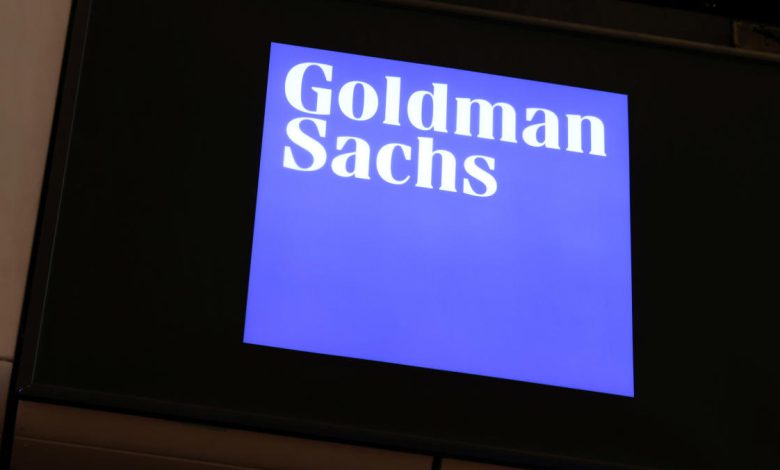Goldman Sachs earnings prove bank still very cyclical

Among the Big Bank stocks, JPMorgan Chase & Co. (JPM), Wells Fargo (WFC), Citigroup (C), Goldman Sachs (GS), and BlackRock (BLK) have been the first to report second-quarter results this earnings season.
Portales Partners founder and Wall Street Beats partner Charlie Peabody comes on Market Domination to talk about the prevalent themes emerging in bank earnings, such as net interest income figures
“Short term, there’s momentum in the capital markets. And so Goldman is a good momentum play, but we argue that their earnings stream remains much more cyclical than the market is valuing them at,” Peabody states. “And that’s the big debate out there in management as they moved away from their failed consumer banking strategy back to their roots as an investment bank, have been trying to convince the street that there is a core underlying earnings power that’s sustainable and stable. And I don’t believe them.”
Peabody also looks ahead to the bank earnings due out this week, such as Morgan Stanley (MS): “I think it’s going to be more of the same — strong, investment banking with an eye towards a pick up in M&A and IPOs in the second half of the year. And then trading will be driven more by equity trading and less so by fixed income trading.”
For more expert insight and the latest market action, click here to watch this full episode of Market Domination.
This post was written by Luke Carberry Mogan.
Video Transcript
All right, big bank earnings are kicking off another season.
Banks we’ve seen so far reporting mixed results with analysts keeping a close eye on net interest income and how potential rate cuts could affect bank earnings for more on those earnings.
We’ve the earnings we’ve seen so far and what’s on deck we’re bringing in Charlie.
Peabody is a partner at Wall Street Beats and founder of portalis partners, Charlie.
It is great to see you.
It has been a minute.
So it’s a pleasure to talk to you.
My pleasure.
So, Charlie from what we’ve heard thus far, um It has indeed been a mixed picture, but if you can kind of zoom out, how would you characterize what we’ve heard so far from?
So we’ve got the among the biggest JP Morgan City, Wells Fargo, we got Goldman Sachs and Black Rock today as well.
But on the on the bank side, specifically, what, what’s sort of your biggest takeaway so far?
But the fundamental trends have been strong capital markets and weak net interest income or spread income.
Um And the question is is that spread income going to inflect positively in the second half of the year.
If it does, that starts to bring the regionals back in as a play.
And we start to see that rotation in the second half of last week away from the, the big money center banks towards the regionals with a continued bid in the capital markets.
Names Charlie.
I wanna get your take on Goldman Sachs.
Of course, reported results this morning investors, Charlie seemed to like what they see to bid this one up stock is now up nearly 30% this year.
But you see avoid this name, Charlie.
It’s, it’s a sell, how come, well, short term, you know, there’s momentum in the capital markets.
And so Goldman is a good momentum play.
Um But we argue that their earning stream remains much more cyclical than the market is uh valuing them at.
And that’s the big debate out there in, in management as they moved away from their failed consumer banking strategy.
Back to their roots as an investment bank have been trying to convince the street that there is a core underlying earnings power that’s sustainable and stable.
And I don’t believe them.
And I think once you start to see more volatility in the capital markets and you’ll see the cyclicality in their earning stream emerge.
Um So I, I think, you know, we’re seeing the best um of that stock price right here right now and, and I would certainly sell it on the flip side.
You like Citigroup, you know, there’s been a lot more sort of belief seemingly in Jane Frazier’s turnaround efforts at that bank.
What was something sort of from this earnings report that really convinced you that she is making progress?
Well, I think Citi has a couple of things within their power that’s not dependent upon the macros, kind of the opposite of Goldman where they’re very dependent upon the macro.
Um, they’re, you know, in the midst of a simplification reorganization process, that’s going to allow them to bring their expense structure down from 54 billion this year to 51 billion by 2026.
They’re in the process of improving their, the um strength of their balance sheet, particularly the capital front.
And I think they’re gonna be able to buy back, you know, multibillion dollars worth of stock at deep discounts to book.
So that should improve their, um you know, rot ce.
Um I, in addition, there are certain businesses um like their credit card business that are under performing and as losses in that um business crest and come down, you’re gonna see a significant improvement in the returns and earnings of that operation.
So we think that stock um is gonna, you know, gravitate more towards book value as they improve their ROTC from a 7% level today towards a 10 to 12% in 26.
And in the meantime, we think they’ll grow book value, you know, towards over $100 in 26.
So we think that discount to that $100 projected book value will narrow um dramatically over the next 2 to 3 years.
Charlie, let’s go ahead to tomorrow morning, Morgan Stanley on deck.
What, what do you expect to hear when they report Charlie?
I think it’s gonna be more of the same, you know, strong um investment banking um with an eye towards a pickup in M and A and IP OS in the second half of the year.
And then trading will be driven more by equity trading and less so by uh fixed income trading.
Um I’m looking for a dollar um 68 in the quarter on about 14.1 billion of revenues.
Do you think that Morgan Stanley is, is subject to the same kind of cyclicality that you talked about with Goldman Sachs?
No.
And, and that’s where, you know what Gorman has done to transform that franchise has been significantly different than what Solomon has tried to do at Goldman Sachs.
He’s built a wealth management operation, an investment investment management operation that have much more stable revenue streams.
So I think they’ve dampened the cyclicality of their investment banking trading part of the franchise.
Charlie.
Thanks again.
Appreciate your perspective.
My pleasure.
Source link



